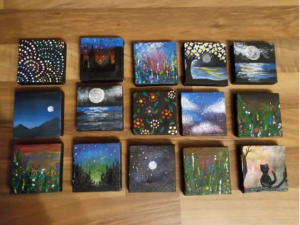 For many children and young people living with Long Covid, the challenge of balancing the demands of education alongside a long term health condition is pausing, with the start of the school summer holidays across the country. The Long Covid Kids Charity shares guidance below for nurses and other parents of children and young people with Long Covid on how to manage during this time.
For many children and young people living with Long Covid, the challenge of balancing the demands of education alongside a long term health condition is pausing, with the start of the school summer holidays across the country. The Long Covid Kids Charity shares guidance below for nurses and other parents of children and young people with Long Covid on how to manage during this time.
New Infections
The ONS reports 105,000 children and young people are currently living with Long Covid in the UK, 22,000 have had symptoms over a year, and 18,000 report activity is “limited a lot”. The figures reflect the total number of children reporting symptoms in the four-week period ending June 4th 2022 and do not yet take into consideration the high numbers of children infected and reinfected at the time of print.
Sadly, the UK, along with most of the world, is in another wave of SARS-CoV-2 infections, and Long Covid Kids anticipates these figures will rise as more children and young people experience their first, or a repeat case, of COVID-19. Evidence suggests that there is an increased risk in experiencing Long Covid following reinfection even following previous successful recoveries. Anecdotal evidence from Long Covid Kids identifies the same, with some families reporting their child has developed Long Covid after their third or fourth infection. Further research is needed.
Recent research found that vaccination reduces the risk of developing Long Covid. Vaccinations are still available for children aged 5 – 15 – you can find out more here.
‘Cautious Tortoise’ has been a well utilised resource since 2021. The poster provides guidance that supports a precautionary approach to returning to previous levels of activity following acute COVID-19 infection. Rest has an important role to play in any post-viral recovery, and has proven particularly pertinent for children managing Long Covid. Many of the families accessing the Long Covid Kids Support Services have been managing symptoms for over two years.
Summer is a time for a Slower Pace of Life
During the summer holidays it may feel tempting to go into ‘retreat mode’; increase rest and reduce routine, to the point where children are doing very little. While it may seem inviting, this could present challenges at the end of the holidays when the young person will suddenly be expected to resume the level of activity they managed in the previous school term. Instead, we encourage families to try to find a balance between rest and activity, through pacing. The holidays provide the perfect opportunity for older children and young people to practice managing pacing themselves.
Pacing
Pacing Penguins is available as a downloadable poster and accompanies a blog that explains the concept of pacing; a well recognised symptom management technique.
Sleep
We recently completed Sleep Right training with Hunrosa Sleep Experts, they are an NHS commissioned and private provider for Sleep Support. They advised that the summer holidays is probably not the best time to tackle sleep challenges, however there are some basic things that you can do during this time.
- Try to keep a fairly regular sleep and wake time, but obviously allow for some fluctuations on days when exciting things are happening e.g. trips out, sleep overs etc.
- Avoid allowing a reversal of sleep/wake times, this can be difficult to correct when the routine of term time comes back around.
- Aim to keep the bedroom at a reasonable temperature to aid sleep.
We provide support on the topic of sleep in more detail in the Long Covid Kids support services.
Keeping Cool
Many with energy limiting long term health conditions find that their symptoms worsen with the heat. Do check out the following tips for keeping cool.
- Cooling garments can be worn such as cool ties (various brands are available) vests, or in materials such as bamboo.
- Keep hydrated – Sip cooled water regularly rather than drinking lots r in one go, young people with symptoms consistent with Postural Orthostatic Tachycardia Syndrome (PoTS) may find electrolytes beneficial.
- Cool pulse points – Run cool water over wrists or use chilled damp flannels.
- Frozen bottles of water placed safely in front of fans are a good makeshift Air Conditioning Unit.
Travel and Days Out with Long Covid
- Planning for episodic conditions isn’t always easy, and plans might not always progress linearly. Here are a few tips that families find useful alongside their family calendar.
- Start by looking at scheduled activities over the holidays and immediately block out those days.
- Next, consider assigning the days either side of the activity days as ‘rest days’.
- Consider planning ahead and adding contingency time to allow for symptom flares.
- Remember that this method may need to be broken down into part days, or hours, this will very much depend on the individual needs of the child, their symptoms and stage of recovery.
- Long Covid is a fluctuating and variable condition so even with the best laid plans it is good to have a Plan B and to practice compassionate self-care.Talking about feelings of upset, frustration or anger can help. Check out page 56 of our support guide for helplines that may also be useful.
Planning Travel
Some people have found adding in travel days before the main event has enabled them to better support their child to pace their energy, e.g. staying somewhere overnight to break up a journey, but this comes with additional cost and isn’t always practical.
Families with children who have been unwell for 8 months or more may want to consider applying for Disability Living Allowance (15 and under) or Personal Independence Payment (16 and over) or Child Disability Payment (in Scotland) that if awarded can help to offset some of the associated additional costs. Where means allow, options like paying for flexible dates or refundable tickets are worth considering too.
Friends and family may be able to provide extra support on days when you have activities booked outside the home, or when there are multiple events for different siblings. Social services might also be able to provide support if you register with them as a carer.
Sunflower Scheme
The Sunflower Scheme is a brilliant initiative that is recognised around the world. Many airports will have staff that offer discreet assistance to individuals wearing the lanyard or wrist band, such as pulling you from a long queue. Children and young people on the LCK youth advisory panel are currently in the process of designing a specific lanyard for children and young people living with Long Covid in collaboration with the Sunflower scheme.
If travelling abroad, or on public transport give serious consideration to Booking Travel Assistance, e.g. support with mobility between trains, around airports and boarding planes. Reducing energy expenditure during travel can mean your child has more energy available to enjoy their destination. Check with your travel operator.
Wheelchairs
Long Covid is a ‘dynamic disability’ which means that the severity of signs and symptoms may increase and decrease between or within days. Families with children who experience extreme exhaustion, post exertional symptom exacerbation (PESE) or pain that would otherwise prevent them from taking part in outings can consider hiring a wheelchair or speaking to their GP about having one prescribed.
The Red Cross will loan manual chairs for a small fee. It is wise to check with the Red Cross’ or your own holiday insurance if you want to take the wheelchair abroad. Seek advice on how to choose a chair that is the right size so that it can be as supportive and comfortable as possible, getting measured is advisable.
Check out the charity Whizz Kidz for more information.
Other Adaptations
It is not uncommon for children and young people living with Long Covid to experience new, or exacerbated sensory challenges. Travel and days out can be quite overwhelming from a sensory perspective, reducing the energy expended through walking by using a chair can help but you may like to consider headphones, earplugs, sunglasses or eye masks to support reducing the impact of auditory or visual stimuli.
Ensure children have ready access to things they like to eat and drink and something that provides them comfort, whether that be an activity or favourite toy. Travel is probably not the time to be having battles over phone or tablet use; many children find using devices helps them regulate emotions and sensory experiences.
Quiet Focus Activities
While being outside is wonderful, it can also trigger symptoms including extreme exhaustion. Lots of fun summer activities that can be enjoyed from home. Make a list of quieter focus activities to keep handy, such as: crafting, colouring, writing, playing board games, cooking, baking and many more.
Some key ways to adapt activities to make them less challenging for more difficult days re:
- Doing them for shorter periods of time.
- Adding regular breaks – even micro breaks of a minute every five can help.
- Considering positioning – e.g. do things in sitting instead of standing.
- Backwards or forwards chaining – having support to complete either the start or end of an activity.
Learn more about the benefits of meaningful activities, such as Rosie’s experience with Art,  at Occupational Therapy for Long Covid.
at Occupational Therapy for Long Covid.
LCK Summer Support Services – Connected and ChatBox
Children and young people with Long Covid report they have found it helpful to connect with others in the same situation. Long Covid Kids provide age appropriate LCK Connected zoom sessions and a protected online chat forum Chatbox for peer support. A programme of events will be available over the summer. Learn more here.
Educational Psychologist Sue Peters will be back with a second blog on 28th August with some Back to School Advice. In the meantime, please see our support guide – Shining a Light on Long Covid in Children and Young People – for further support and guidance on supporting children with symptoms, everyday life, accessing healthcare and education.
Written by:
Kirsty Stanley – LCK Senior Occupational Therapist and Independent Occupational Therapist at Occupation4Life Ltd
Sammie McFarland – Founder & CEO Long Covid Kids